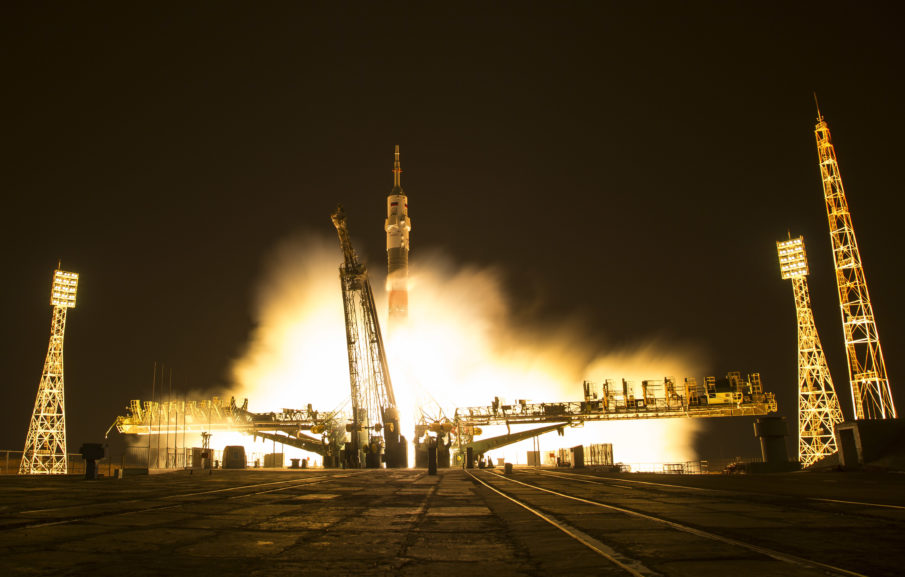President Trump’s directive to establish a new branch of the United States Military tasked specifically with orbital defense is not without controversy within the United States, but some of the most interesting responses to this initiative have come from foreign competitors. Russia, in particular, has been particularly vocal in their condemnation of an American Space Force, immediately postulating that such an enterprise could only mean the placement of nuclear weapons in orbit — a clear violation of the 1967 Outer Space Treaty banning such activity.
In June, Viktor Bondarev, the head of the Russian Federation Council’s Defense and Security Committee, had this to say about America’s pursuit of a space-specific branch:
There is a major risk that the Americans would commit grave violations in this field … if one takes into account what they do in other spheres. Of course, let’s hope that the American political elite still has the remnants of reason and common sense, but if the US withdraws from the 1967 treaty banning nuclear weapons in outer space, then, of course, not only ours, but also other states will be followed by a tough response aimed at ensuring world security.”
Russia’s assumption that a Space Force would almost certainly lead to violations of longstanding treaties between them and the United States, however, may seem ironic considering Russia stood up the most recent incarnation of their own space branch of the military nearly three years ago. It seems unlikely that Bondarev is unaware of an entire branch of his nation’s armed forces, of course, seemingly suggesting that Russia’s public statements regarding the new American military force are aimed not at lawmakers and politicians, but rather at American media outlets that can sometimes be eager to paint Trump-led initiatives in a negative light. Much like Russia’s attempts at influencing American voters during election cycles, Russia’s information operations utilize a combination of legitimate-seeming media reports and concerted social media efforts to sway public perception rather than policy, aware that on an extended timeline, that perception among voters will serve as a stronger influence on policy than direct pressure ever could.
Of course, Russia’s the narratives peddled in these disinformation campaigns often run in complete contrast with actual Russian policy. Their efforts to portray the formation of a “Space Force” as a unilateral American militarization of orbit fails to acknowledge the standing branches of both Russia’s and China’s military already devoted to that very endeavor, and now, new statements made before the United Nations by Yleem D.S. Poblete, U.S. Assistant Secretary of State for Arms Control, Verification, and Compliance, offer greater perspective into the breadth of Russia’s ongoing military activities in space. These activities include, as may come as little surprise, what may already be offensive platforms in orbit above earth today, as well as at least one intended to target and destroy satellites using lasers that are not in orbit.
Poblete did not pull any punches when offering a brief summary of Russia’s efforts to expand its military capabilities in orbit in recent years, despite their efforts to paint America’s late entry into the realm as unprovoked aggression:
The United States has raised concerns over many years that the Russian Federation is actively pursuing the development and deployment of anti-satellite weapons. Since 2009, the Russian Ministry of Defense officials have repeatedly and publicly confirmed that anti-satellite weapons development is being conducted in Russia. And as recently as February 2017, a Russian Air Force Squadron Commander stated that Russia is developing new missiles with the express intent of destroying satellites. Furthermore, we have read statements from the Russian Ministry of Defense that it is working on creating ‘a mobile attack anti-satellite system.’ The Russian Ministry of Defense recently announced that its Space Troops have received a mobile laser system, which Vladimir Putin announced to the world on March 1 of this year. Russia’s leader has himself alluded to space weapons being more “acceptable in the political and military respect.”
One element of Russia’s ongoing space operations that has drawn particular concern is a platform referred to as “Space Apparatus Inspector.” This system, announced by Russian officials in October, has demonstrated erratic behavior in orbit that is seemingly indicative of a mobile platform that could potentially be used to interfere with or even destroy other satellites.
Its behavior on-orbit was inconsistent with anything seen before from on-orbit inspection or space situational awareness capabilities, including other Russian inspection satellite activities. We are concerned with what appears to be very abnormal behavior by a declared ‘space apparatus inspector.’ We don’t know for certain what it is and there is no way to verify it. But Russian intentions with respect to this satellite are unclear and are obviously a very troubling development – particularly, when considered in concert with statements by Russia’s Space Force Commander who highlighted that ‘assimilate[ing] new prototypes of weapons [into] Space Forces’ military units’ is a ‘main task facing the Aerospace Forces Space Troops.’”
Like in the realm of hypersonic missile technology, experts agree that the United States is currently years behind the offensive space programs under development in Russia and China. This technology gap, coupled with America’s reliance on orbital assets for everything from communications to navigation, is largely the driving force behind the political endeavor to stand up a Space Force.
Featured image: In this one-second exposure photograph, the Soyuz MS-03 spacecraft is seen launching from the Baikonur Cosmodrome with Expedition 50 crewmembers NASA astronaut Peggy Whitson, Russian cosmonaut Oleg Novitskiy of Roscosmos, and ESA astronaut Thomas Pesquet from the Baikonur Cosmodrome in Kazakhstan, Friday, Nov. 18, 2016, Kazakh time. Whitson, Novitskiy, and Pesquet will spend approximately six months on the International Space Station. | NASA/Bill Ingalls
Already have an account? Sign In
Two ways to continue to read this article.
Subscribe
$1.99
every 4 weeks
- Unlimited access to all articles
- Support independent journalism
- Ad-free reading experience
Subscribe Now
Recurring Monthly. Cancel Anytime.











COMMENTS